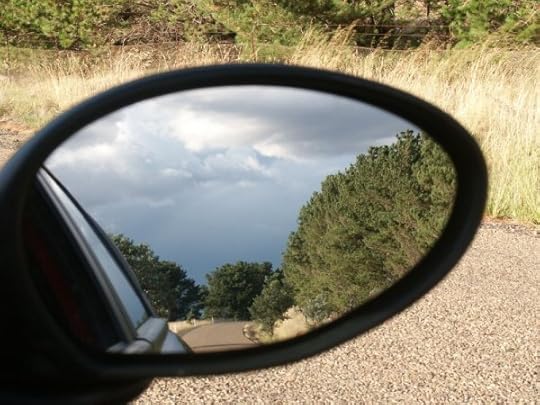Terry Teachout's Blog, page 135
September 11, 2012
TT: After the fact
 My mother
died
four months ago. I had to go back on the road a few days later, and since then I've been moving around pretty constantly. I feared--and still do--that being so busy might make it harder for me to absorb and accept the irreversible fact of her death. This was one of the reasons why I wrote the
essay
about the experience of watching a loved one die that I posted in this space in June. I started working on "The Long Goodbye" just two weeks after my mother's funeral, hoping that the familiar act of writing might help me come to terms with the terrible spectacle that I had witnessed.
My mother
died
four months ago. I had to go back on the road a few days later, and since then I've been moving around pretty constantly. I feared--and still do--that being so busy might make it harder for me to absorb and accept the irreversible fact of her death. This was one of the reasons why I wrote the
essay
about the experience of watching a loved one die that I posted in this space in June. I started working on "The Long Goodbye" just two weeks after my mother's funeral, hoping that the familiar act of writing might help me come to terms with the terrible spectacle that I had witnessed.I read part of "The Long Goodbye" at the MacDowell Colony in June, and I was struck by the intensity with which my fellow colonists responded to what is, after all, a perfectly ordinary story. It didn't occur to me until later that nearly all of them were younger than me, that the experience I described was one that they had not yet had, and that I might have succeeded in making it real to them by writing frankly and straightforwardly about something that most people prefer insofar as possible not to talk about at all.
Did it help me to write "The Long Goodbye"? I'm not so sure. It's true that I've spent surprisingly little time brooding about my mother's death, but that may well be because her final illness was so protracted and her suffering so great. I knew that it was time for her to go, and so, I feel certain, did she. When she died, I felt relieved.
 And how do I feel now? Again, I'm not sure. Of course I miss my mother--I adored her--but when I think of her now, I usually think of the last couple of years of her life, which were happy only at odd and increasingly infrequent intervals. It requires a powerful act of will for me to summon up the countless good times that came before. More than once I've reached reflexively for my cellphone while taking a cab to Times Square to see a Broadway show, telling myself that I'll have just enough time to give her a quick call before I get to the theater. Mostly, though, I don't think of her all that often, save in brief flashes. The veil, it seems, has descended.
And how do I feel now? Again, I'm not sure. Of course I miss my mother--I adored her--but when I think of her now, I usually think of the last couple of years of her life, which were happy only at odd and increasingly infrequent intervals. It requires a powerful act of will for me to summon up the countless good times that came before. More than once I've reached reflexively for my cellphone while taking a cab to Times Square to see a Broadway show, telling myself that I'll have just enough time to give her a quick call before I get to the theater. Mostly, though, I don't think of her all that often, save in brief flashes. The veil, it seems, has descended."You've wept enough," Creon tells Oedipus in Sophocles' Oedipus Rex. "Time is the great healer, you will see." No doubt it is, and no doubt it is already doing its painstaking and necessary work. I'm not weeping anymore. I wonder whether I should be.
Published on September 11, 2012 22:00
TT: Snapshot
The Paperwork Explosion, Jim Henson's 1967 promotional film for the Magnetic Tape Selectric Typewriter, IBM's first word processor. The electronic soundtrack was created by Henson and Raymond Scott:
(This is the latest in a series of arts-related videos that appear in this space each Monday and Wednesday.)
(This is the latest in a series of arts-related videos that appear in this space each Monday and Wednesday.)
Published on September 11, 2012 22:00
TT: Almanac
The Bustle in a House
The Morning after Death
Is solemnest of industries
Enacted upon Earth--.
Emily Dickinson, "The Bustle in a House"
Published on September 11, 2012 22:00
TT: In memory of...
Dawn Upshaw, Hugh Wolff, and the St. Paul Chamber Orchestra perform Aaron Copland's setting of Emily Dickinson's "The World feels dusty":
Published on September 11, 2012 06:59
September 10, 2012
TT: Almanac
For always roaming with a hungry heart,
Much have I seen and known.
Alfred Tennyson, "Ulysses"
Published on September 10, 2012 19:41
TT: Lookback
 From 2004:
From 2004:In a better-organized world, an artist would be able to earn inspiration. He'd get up bright and early after having gone to bed at a reasonable hour, eat a nutritious breakfast, sharpen his pencils, go out to walk the dog and help an old lady across the street, and return to his desk secure in the knowledge that the muse would descend at ten a.m. sharp. Fat chance. To be sure, regular habits are good for artists. They make it easier to be inventive on demand. But inspiration, unlike invention, won't come when it's called. It's a cat, not a dog....
Read the whole thing here .
Published on September 10, 2012 19:41
TT: Treadmill in the sky (II)
 I saw two friends while I was in Spring Green. One of them,
Keiran Murphy
, a Frank Lloyd Wright scholar who works at
Taliesin
, is a full-time resident. The other, Our Girl, drove up from Chicago on Saturday to pay me a visit and see a show. In between their visits, I retired to the hotel's hot tub three times a day, read a couple of books about which I'm thinking of writing pieces, bought a wedge of Mrs. T's favorite
cheese
, and pegged away at the script of Satchmo at the Waldorf, which needs a modest amount of further nipping and tucking before it opens in New Haven next month.
I saw two friends while I was in Spring Green. One of them,
Keiran Murphy
, a Frank Lloyd Wright scholar who works at
Taliesin
, is a full-time resident. The other, Our Girl, drove up from Chicago on Saturday to pay me a visit and see a show. In between their visits, I retired to the hotel's hot tub three times a day, read a couple of books about which I'm thinking of writing pieces, bought a wedge of Mrs. T's favorite
cheese
, and pegged away at the script of Satchmo at the Waldorf, which needs a modest amount of further nipping and tucking before it opens in New Haven next month.It wasn't a vacation--I won't have time to take one this year--but at least I didn't have to be anywhere in a hurry. It helped, too, that I was in Spring Green , a very small town (pop. 1,600, more or less) of which I'm deeply fond, and not just because it's home to Keiran, American Players Theatre, and Taliesin. Something about Spring Green speaks powerfully to me, so much so that my heart lifts each summer when I drive past the city-limits sign. The scale is right, the people agreeable, and there's even a first-class bookstore . If my life were to arrange itself differently--very differently, to be sure--I could see myself living there.
 To dream of pulling up stakes and starting a new life in a new place is one of the most pleasant perks of being a near-ceaseless traveler. Most of the time, of course, it's nothing more than a fleeting fantasy, not unlike what Rupert Holmes describes in "The People That You Never Get to Love": And you'll see him on a train that you've just missed/At a bus stop where your bus will never stop. Yet I've visited a half-dozen cities, each of them greatly different from the others, in which I found it easy to imagine myself settling down: Chicago, San Diego, Santa Fe, Spring Green,
Waco
, and
Winter Park
.
To dream of pulling up stakes and starting a new life in a new place is one of the most pleasant perks of being a near-ceaseless traveler. Most of the time, of course, it's nothing more than a fleeting fantasy, not unlike what Rupert Holmes describes in "The People That You Never Get to Love": And you'll see him on a train that you've just missed/At a bus stop where your bus will never stop. Yet I've visited a half-dozen cities, each of them greatly different from the others, in which I found it easy to imagine myself settling down: Chicago, San Diego, Santa Fe, Spring Green,
Waco
, and
Winter Park
.On balance, I suppose that Spring Green is the unlikeliest of the six. I've spent the past quarter-century, after all, living in the busiest and grandest of cities, and I've grown used to what it has to offer--but maybe that's part of what makes a place like Spring Green so attractive to an aging small-town boy who has no trouble at all remembering the unassuming joys of the place where he grew up.
 Today I fly back to New York, there to see and write about a pair of shows on and off Broadway, and on Thursday I return to Connecticut and Mrs. T. That's my life, which for the past few months has been reminding me of this speech from Satchmo at the Waldorf:
Today I fly back to New York, there to see and write about a pair of shows on and off Broadway, and on Thursday I return to Connecticut and Mrs. T. That's my life, which for the past few months has been reminding me of this speech from Satchmo at the Waldorf:I had me a beautiful life. Even growing up poor. Didn't like all of it--how could I? But I always look forward. Always say, "Let's head for the next town, play the next show, something better gonna be right up ahead." And it always was.
Me, too, Pops. I don't like all of my life, either, but it's beautiful anyway--and there's always something better right up ahead.
(Second of two parts)
Published on September 10, 2012 19:41
September 9, 2012
TT: Treadmill in the sky (I)
I love nearly everything about my life as a peripatetic drama critic, but it does have its disadvantages, one of which is that I sometimes have to work in odd places. On Thursday, for instance, I flew to Chicago and drove from there to Spring Green, Wisconsin, where I saw three shows at
American Players Theatre
. While waiting for my plane in New York, I corrected the proofs of the revised piano score of
The Letter
and fielded queries from my editors at The Wall Street Journal about that week's drama column.
 Such pesky chores are easier to do at home, but I haven't been there much of late. In the past three months, I think I've spent something like five nights--maybe fewer, definitely not more--at the Manhattan apartment where Mrs. T and I affect to hang our hats. What with my reviewing trips to California, Canada, Chicago, Connecticut, Massachusetts, Minneapolis, New Hampshire, and Wisconsin, my five-week stay at the
MacDowell Colony
, and the like amount of time that I spent rehearsing and attending performances of
Satchmo at the Waldorf
, I haven't had time to do anything but (as my brother likes to say) put one foot in front of the other, day after day after day.
Such pesky chores are easier to do at home, but I haven't been there much of late. In the past three months, I think I've spent something like five nights--maybe fewer, definitely not more--at the Manhattan apartment where Mrs. T and I affect to hang our hats. What with my reviewing trips to California, Canada, Chicago, Connecticut, Massachusetts, Minneapolis, New Hampshire, and Wisconsin, my five-week stay at the
MacDowell Colony
, and the like amount of time that I spent rehearsing and attending performances of
Satchmo at the Waldorf
, I haven't had time to do anything but (as my brother likes to say) put one foot in front of the other, day after day after day.
You wouldn't think that correcting The Letter would be so urgent a task, seeing as how it won't be receiving its New York premiere until next February. But operas have a longer lead time than plays, and it's essential that Subito Music, the publisher of The Letter, get the revised piano score into print right away so that the singers who will perform it five months from now can start learning their roles.
Fortunately, working on the fly doesn't faze me. As longtime readers of this blog will recall, I wrote much of the original version of The Letter en route from one unlikely destination to another, and I actually proofread the orchestral score of the first four scenes while sitting in a train station in San Diego. I didn't like it, but I did it. To quote for the umpteenth time the wise words of James Burnham, "If there's no alternative, there's no problem."
 For all the aforementioned reasons, I haven't been doing much reading for pleasure lately, whether on paper or via the web, though I did find time to peruse Jordan Levin's Miami Herald
appreciation
of Edward Villella and his legacy (I agree with every word) and Sarah Weinman's
essay
on the novels of Dorothy B. Hughes (which interested me so much that I immediately ordered a copy of
The Expendable Man
).
For all the aforementioned reasons, I haven't been doing much reading for pleasure lately, whether on paper or via the web, though I did find time to peruse Jordan Levin's Miami Herald
appreciation
of Edward Villella and his legacy (I agree with every word) and Sarah Weinman's
essay
on the novels of Dorothy B. Hughes (which interested me so much that I immediately ordered a copy of
The Expendable Man
).
Otherwise I stuck to the treadmill, devoting such occasional moments of leisure as I had to the novels of Elmore Leonard, Rex Stout, and P.G. Wodehouse, all of which stimulate my mind without distracting me from the tasks at hand, whatever they may be.
(First of two parts)
 Such pesky chores are easier to do at home, but I haven't been there much of late. In the past three months, I think I've spent something like five nights--maybe fewer, definitely not more--at the Manhattan apartment where Mrs. T and I affect to hang our hats. What with my reviewing trips to California, Canada, Chicago, Connecticut, Massachusetts, Minneapolis, New Hampshire, and Wisconsin, my five-week stay at the
MacDowell Colony
, and the like amount of time that I spent rehearsing and attending performances of
Satchmo at the Waldorf
, I haven't had time to do anything but (as my brother likes to say) put one foot in front of the other, day after day after day.
Such pesky chores are easier to do at home, but I haven't been there much of late. In the past three months, I think I've spent something like five nights--maybe fewer, definitely not more--at the Manhattan apartment where Mrs. T and I affect to hang our hats. What with my reviewing trips to California, Canada, Chicago, Connecticut, Massachusetts, Minneapolis, New Hampshire, and Wisconsin, my five-week stay at the
MacDowell Colony
, and the like amount of time that I spent rehearsing and attending performances of
Satchmo at the Waldorf
, I haven't had time to do anything but (as my brother likes to say) put one foot in front of the other, day after day after day.You wouldn't think that correcting The Letter would be so urgent a task, seeing as how it won't be receiving its New York premiere until next February. But operas have a longer lead time than plays, and it's essential that Subito Music, the publisher of The Letter, get the revised piano score into print right away so that the singers who will perform it five months from now can start learning their roles.
Fortunately, working on the fly doesn't faze me. As longtime readers of this blog will recall, I wrote much of the original version of The Letter en route from one unlikely destination to another, and I actually proofread the orchestral score of the first four scenes while sitting in a train station in San Diego. I didn't like it, but I did it. To quote for the umpteenth time the wise words of James Burnham, "If there's no alternative, there's no problem."
 For all the aforementioned reasons, I haven't been doing much reading for pleasure lately, whether on paper or via the web, though I did find time to peruse Jordan Levin's Miami Herald
appreciation
of Edward Villella and his legacy (I agree with every word) and Sarah Weinman's
essay
on the novels of Dorothy B. Hughes (which interested me so much that I immediately ordered a copy of
The Expendable Man
).
For all the aforementioned reasons, I haven't been doing much reading for pleasure lately, whether on paper or via the web, though I did find time to peruse Jordan Levin's Miami Herald
appreciation
of Edward Villella and his legacy (I agree with every word) and Sarah Weinman's
essay
on the novels of Dorothy B. Hughes (which interested me so much that I immediately ordered a copy of
The Expendable Man
).Otherwise I stuck to the treadmill, devoting such occasional moments of leisure as I had to the novels of Elmore Leonard, Rex Stout, and P.G. Wodehouse, all of which stimulate my mind without distracting me from the tasks at hand, whatever they may be.
(First of two parts)
Published on September 09, 2012 22:00
TT: Just because
Robert Mitchum appears as the mystery guest on What's My Line?:
(This is the latest in a series of arts-related videos that appear in this space each Monday and Wednesday.)
(This is the latest in a series of arts-related videos that appear in this space each Monday and Wednesday.)
Published on September 09, 2012 22:00
TT: Almanac
"Leisure is the time for doing something useful. This leisure the diligent person will obtain, the lazy one never."
Benjamin Franklin, Poor Richard's Almanack
Benjamin Franklin, Poor Richard's Almanack
Published on September 09, 2012 22:00
Terry Teachout's Blog
- Terry Teachout's profile
- 45 followers
Terry Teachout isn't a Goodreads Author
(yet),
but they
do have a blog,
so here are some recent posts imported from
their feed.



